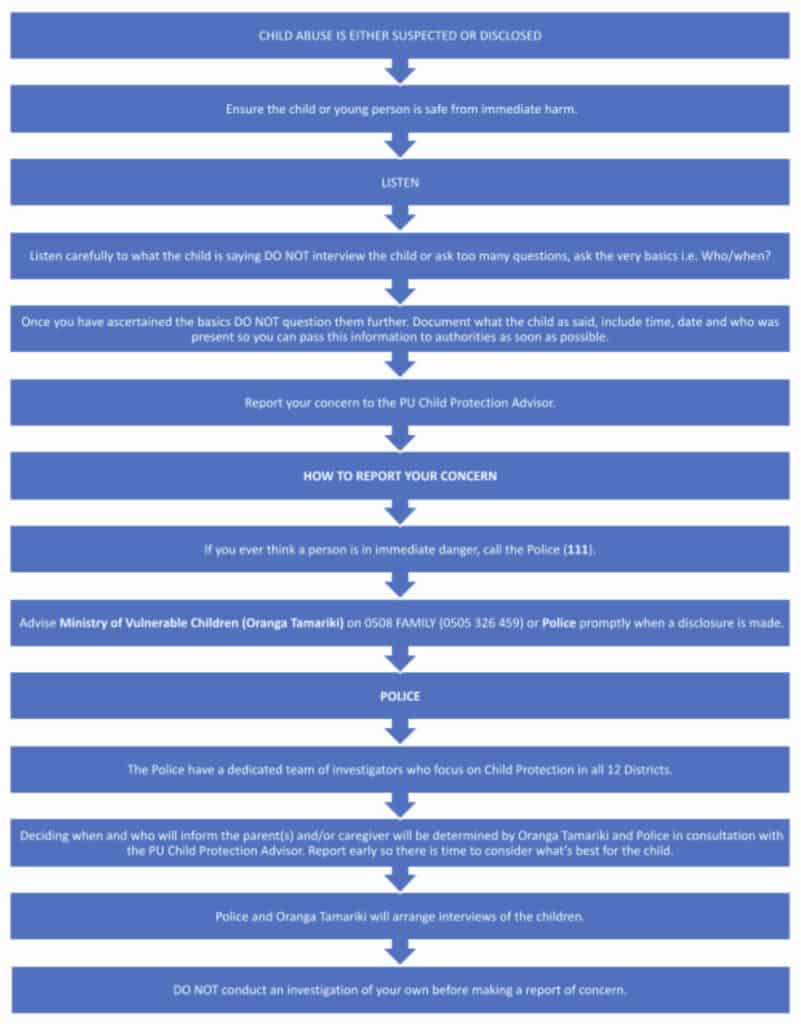1.0 Introduction
Ensuring the wellbeing and safety of children, including prevention of child abuse or maltreatment, is of paramount importance to us at Rx Fitness 235 Ltd. This policy provides guidance about how to identify and respond to concerns about the wellbeing of a child, including possible abuse or neglect.
- 1.1 The process for responding to a concern about a child is attached as Appendix B.
- 1.2 The interests of the child will be the absolute priority when any action is taken in response to suspected abuse or neglect. This organisation commits to support the statutory agencies (Ministry of Vulnerable Children (Oranga Tamariki) and the New Zealand Police (the Police) to investigate abuse and will report suspected cases and concerns to these agencies as per the process in this policy.
- 1.3 The Child Protection Advisor for Rx Fitness 235 Ltd will be responsible for carrying out the responsibilities outlined in this policy. Staff will not assume responsibility beyond the level of their experience and training. Our organisation commits to ensuring staff have access to the information and training they need.
- 1.4 This policy was authored by Nicola Jane Hira (Chairman) on 27th May 2021. Nicola Jane Hira (Chairman) is responsible for the maintenance and three yearly review of this policy. A digital copy can be found on our website at www.rxfitness235.co.nz. The policy is due to be updated on 27th May 2024. It is consistent with Ministry of Vulnerable Children (Oranga Tamariki) and Police guidelines and will be updated when new guidance is issued.
2.0 Purpose, Scope and Principles
Our child protection policy supports our staff to respond appropriately to potential child protection concerns, including suspected abuse or neglect. It is our organisation’s commitment to protect children from abuse and to recognise the important roles all our staff have in protecting children.
- 2.1 This policy provides a framework and expectations to protect children, including (but not limited to) staff behaviours in response to actual or suspected child abuse and neglect. It applies to all the Rx Fitness 235 Ltd staff, including volunteers and part-time or temporary roles and contractors.
- 2.2 In addition to guiding staff to make referrals of suspected child abuse and neglect to the statutory agencies – i.e., Ministry of Vulnerable Children (Oranga Tamariki) and the Police – this policy will also help our staff identify and respond to the needs of the many vulnerable children whose wellbeing is of concern.
- 2.3 We also commit to exploring opportunities to work with other providers, including from other sectors, to develop a network of child protection practice in our community.
3.0 Definition of Child Abuse
The Children, Young Persons and their Families Act 1989 defines child abuse as ‘…the harming (whether physically, emotionally, sexually) ill-treatment, abuse, neglect or deprivation of any child or young person”.
- 3.1 Physical abuse is any act that may result in physical harm of a child or young person. It can be but is not limited to: bruising, cutting, hitting, beating, biting, burning, causing abrasions, strangulation, suffocation, drowning, poisoning and fabricated or induced illness.
- 3.2 Emotional abuse is the persistent emotional ill-treatment of a child such as to cause severe and persistent adverse effect on the child’s emotional development. This can include a pattern of rejecting, degrading, ignoring, isolating, corrupting, exploiting or terrorising. It may also include age or developmentally inappropriate expectations being imposed on children. It also includes the seeing or hearing the ill-treatment of others.
- 3.3 Sexual abuse involves forcing or enticing a child or young person to take part in sexual activities as well as non-contact acts such as involving children in the looking at or production of sexual images, sexual activities and sexual behaviours.
- 3.4 Neglect is the persistent failure to meet a child’s basic physical and/or psychological needs, causing long term serious harm to the child’s health or development. If may also include neglect of a child’s basic or emotional needs.
4.0 Roles and Responsibilities of Staff
- 4.1 It is the responsibility of staff to be vigilant, have knowledge and awareness of the indicators of neglect, potential or actual abuse and to report any concerns, suspicions or allegations of suspected abuse immediately and ensure that the concern is taken seriously and reported.
- 4.2 Rx Fitness 235 Ltd will have an appointed Child Protection Advisor. This function will be held by:
Nicola Jane Hira – 0211272585/[email protected]
5.0 Child Protection Procedures
- 5.1 All concerns of potential, suspected or alleged abuse must be brought to the attention of the PU Child Protection Advisor.
- 5.2 If a child/young person makes a verbal disclosure to a member of staff it is important that staff take what the member says seriously.
- 5.3 Staff are to listen carefully to what the member is saying and are not to interview them or ask too many questions, ask the very basics i.e. Who/when?
- 5.4 Once the basics have been ascertained, no further questions are to be asked. What the member has said is to be documented, this should include time, date and who was present. This information will be passed onto authorities as soon as possible.
- 5.5 Advise Ministry of Vulnerable Children (Oranga Tamariki) or Police promptly when a disclosure is made.
- 5.6 Deciding when and who will inform the parent(s) and/or caregiver will be determined by Ministry of Vulnerable Children (Oranga Tamariki) and Police in consultation with the PU Child Protection Advisor.
6.0 Training
6.1 All staff will receive child protection training at the appropriate level for their role.
7.0 Confidentiality and Information Sharing
- 7.1 We will seek advice from Ministry of Vulnerable Children (Oranga Tamariki) and/or the Police before identifying information about an allegation is shared with anyone, other than the service manager or designated person. Staff should be aware that:
- 7.2 Under sections 15 and 16 of the Children, Young Persons, and Their Families Act 1989 any person who believes that a child has been or is likely to be, harmed physically, emotionally or sexually or ill-treated, abused, neglected or deprived may report the matter to Ministry of Vulnerable Children (Oranga Tamariki) or the Police. Provided the report is made in good faith, no civil, criminal or disciplinary proceedings may be brought against them.
- 7.3 When collecting personal information about individuals, it is important to be aware of the requirements of the privacy principles – i.e., the need to collect the information directly from the individual concerned and when doing so to be transparent about: the purposes for collecting the information and how it will be used; who can see the information; where it is held; what is compulsory/voluntary information; and that people have a right to request access to and correction of their information.
- 7.4 Staff may, however, disclose information under the Privacy Act/Health Information Privacy Code where there is good reason to do so – such as where there is a serious risk to individual health and safety (see privacy principle 11/Code rule 11). Disclosure about ill-treatment or neglect of a child/young person may also be made to the Police or Ministry of Vulnerable Children (Oranga Tamariki) under sections 15 and 16 of the Children, Young Persons, and Their Families Act 1989.
8.0 Child Safe Practice Guidelines
- 8.1 If any form of physical contact is required ask the person’s permission, explain what you are doing and why to both the child and their parents/caregivers.
- 8.2 Where possible ask parents/caregivers to be responsible for children or young people in changing rooms. Always ensure that whoever supervises does so in pairs.
- 8.3 Where there are mixed teams away overnight, teams should always be accompanied by an adult male and female coach or helper.
- 8.4 If it’s necessary to do things of a personal nature for a child, make sure you have another adult accompanying you. Get the consent of the parent/caregiver and if possible the child. Let them know what you are doing and why.
- 8.5 Avoid situations where you are alone with a child. While acknowledging that occasionally there may be no alternative, for example, where a child falls ill and has to be taken home. However, one-to-one contact must never be allowed to occur on a regular basis.
- 8.6 Don’t allow physically rough or sexually provocative games, or inappropriate talking or touching.
- 8.7 Ensure that any claims of abuse by a child are taken seriously and that the guide to report suspected or actual abuse included in this policy as an appendix is followed.
- 8.8 Ensure that the nature and intensity of training and competition does not exceed the capacity of a child’s immature growing body and ability.
- 8.9 Ensure that use of photographic images and video are aligned to relevant privacy policies.
- 8.10 Ensure that all the people responsible for children and young people at any given time should always remain in an alcohol-free state that they can react appropriately to any situation that might arise.
9.0 Allegations made against members of Staff
- 9.1 Allegations, suspicions or complaints of abuse against staff, volunteers or representatives must be taken seriously and reported to the PU Child Protection Advisor who will deal with them immediately, sensitively and expediently within the procedures outlined in this Section.
- 9.2 It is not the responsibility of the staff to investigate allegations of child abuse.
- 9.3 If the Police decide to undertake a criminal investigation then the member of staff may be suspended, without prejudice, as a precautionary measure. It is important that no internal investigation is undertaken and no evidence gathered that might prejudice the criminal investigation.
Ratified by Nicola Jane Hira (Chairman and Owner of Rx Fitness 235 Ltd)
Signed: ____________________________
Date: _____________________



